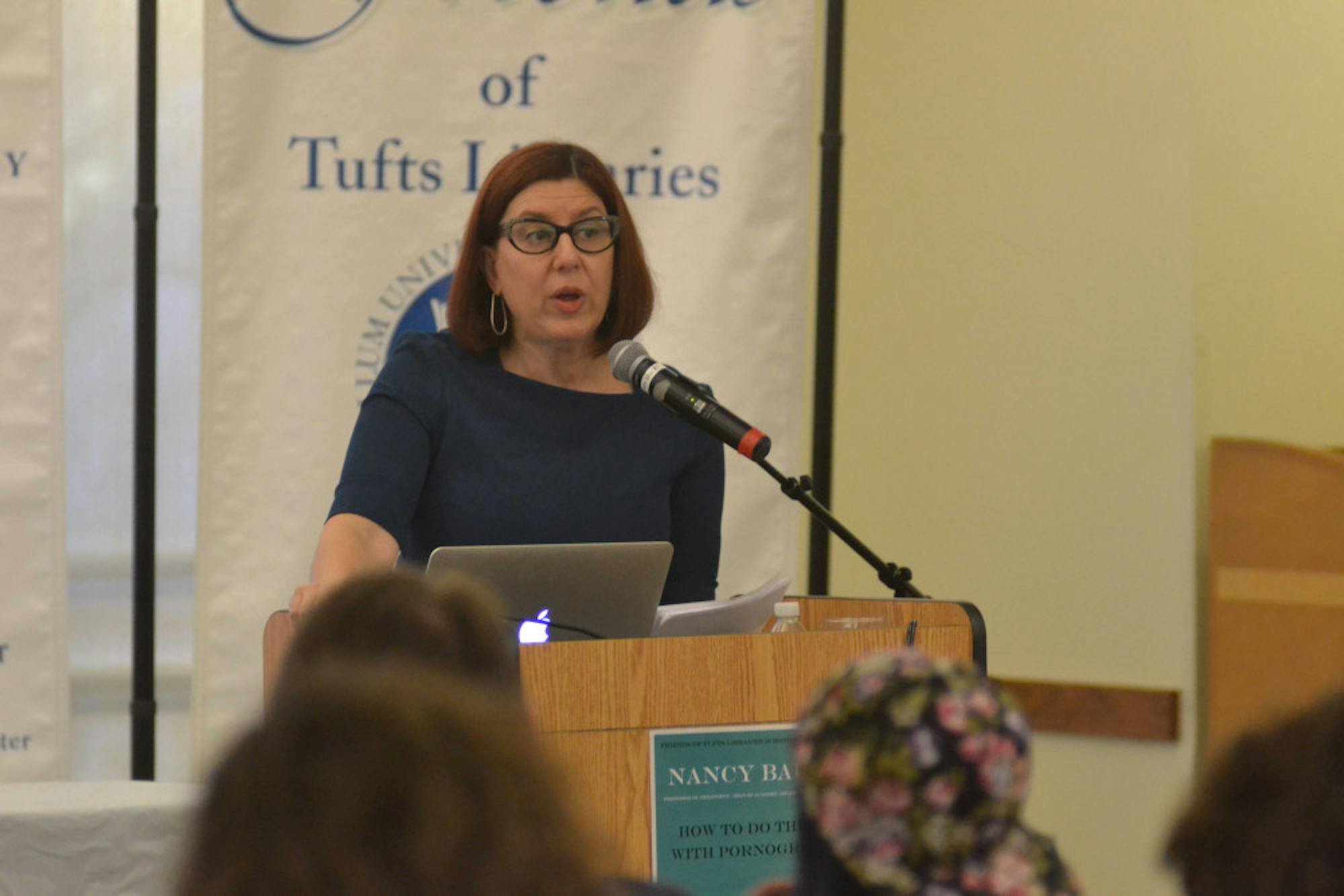Nancy Bauer, philosophy professor and dean of academic affairs for Arts and Sciences, discussed her new book "How to Do Things With Pornography" in the Hirsch Reading Roomyesterday afternoon. "How to Do Things With Pornography" was released this past April.
Bauer was the second speaker in the library’s ongoing Author Talk program, which is hosted by Friends of Tufts Libraries. The first, held in mid-October, featured a talk by biologist and Tufts alumnus Noah Wilson-Rich (G'11). According to the Tisch website, Bauer's book models a new way to write philosophically about pornography, women’s self-objectification, hook-up culture and other contemporary phenomena.
Bauer began her talk discussing the differences between her own upbringing and her childrens'. However hard parents may try to shield their children, the fact is that kids these days have practically unlimited access to sexual content online and through social media, she said.
Bauer then introduced the philosophical view of pornography as described by American feminist and scholar Catharine MacKinnon, who adopted Karl Marx's interpretations of capitalism for her theory of sex differences. According to MacKinnon and proponents of her views, pornography perpetuates the subordination of women by showing women enjoying their submissive roles.
"[They argued that] pornography at the end of the day is sex discrimination," she said.
In the 1980s, MacKinnon and others built a new definition of pornography that frames pornography as a civil rights violation against women, according to Bauer.
"We define pornography as the graphic sexually explicit subordination of women in pictures or words," MacKinnon wrote in 1995.
MacKinnon worked to help pass an ordinance in Indianapolis that would allow women to file sex discrimination charges against porn producers, Bauer said. However, the ordinance was ultimately challenged in court and overturned.
Bauer referenced Rae Langton, a professor of philosophy at the University of Cambridge, in her talk. She argued that MacKinnon's claim that pornography constitutes the subordination of women in and of itself makes sense when studied from the perspective of speech-act theory -- a theory based on the claim that words themselves can make a difference in the world and sometimes cause harm. Pornography, from this perspective, should not be protected by freedom of expression laws, since it silences and legitimates violence towards women and ranks them as inferior.
Bauer next talked about consent, discussing the difference between "'no' means 'no'" policies and "'yes' means 'yes,'" or affirmative consent, policies. Affirmative consent policies, which require that both parties involved in a sexual interaction clearly indicate that they want to engage in any sexual activities, have been adopted by many schools -- including Tufts -- in recent years. However, even affirmative consent has problems and cannot eliminate miscommunications in sex, she said.
"Sometimes people say 'yes' because they're afraid," Bauer said, discussing the issues of affirmative consent. "Also 'yes' isn't always said during consensual sex."
The issue at the heart of Bauer's discussion was the importance of talking about sex.
"We are unable to talk as a culture about sex in an honest way, and this is causing problems that ramify in our confusion in how to think about sexual assault policy," she said. "In porn, everyone loves sex, and everyone has orgasms eventually. In sex education classes, kids are told a thousand times to be safe and not to do what they want to do. What we don't talk about with ourselves or with our kids is that having a physical relationship with another person is often no less confusing or messy or complicated than any other human interaction."
Bauer concluded her talk by posing questions to the audience. Should there be more models for discussing sex and relationships?
"Most important," she said. "Are these the sorts of questions that philosophers should be asking?"
Nancy Bauer discusses philosophy, pornography at Author Talk

Dean Bauer is pictured at a speaking event in 2015.





